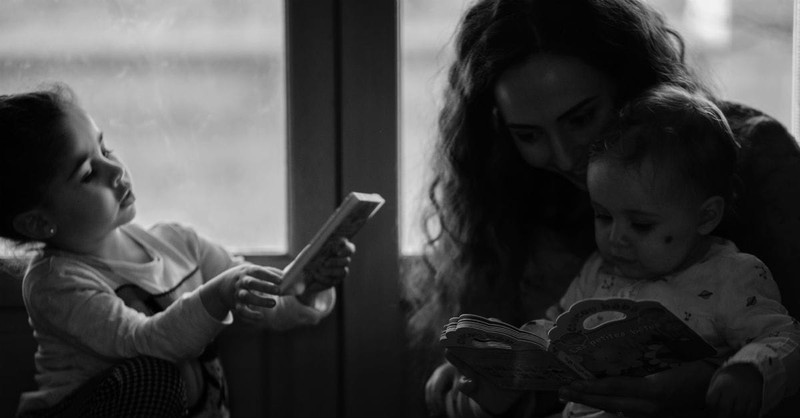
A lot of parents buy the book Beyond Sibling Rivalry, but I suspect few buy it when one sibling is still in the womb. I knew I was just slightly premature in reading and annotating said book—but that did not prevent me from devouring it, my three-month baby bump just barely big enough to require elastic waistbands.
I’m a planner, a preparer, a think-ahead-girl, so it’s no surprise that I thought about the road ahead of me in minute detail. All parents do this: we prepare, sometimes ineffectively, for the kiddoes God gifts us with.
So how should we prepare our lives for children? Where should we spend our energy, focus our attention, or put all that new-baby gear?
There’s no way to perfectly prepare yourself for the reality of parenting, but I do think there are important areas to consider. Here are a few ideas:
Photo Credit: Thinkstock

1. Educate Yourself about Post-Partum Depression
This is the simplest thing you can do to prepare for parenthood, and possibly the most life-changing.
My friend Amy told me she had been diagnosed with post-partum depression not long after my daughter, Lucy, had just turned two.
“I never had PPD with Lucy,” I said, laughing a little bitterly. “I just felt enraged and panicky for a year.”
Amy went very still. “Heather, anxiety and anger are both symptoms of PPD.”
Photo credit: ©Thinkstock

20% of New Moms Struggle with PPD—Know the Signs
I gaped at her. I had spent my first years a mother ashamed of my short fuse, my panicky insomnia, my anger at my husband and friends, but I assumed I was simply a terrible person. It had never, ever crossed my mind that I had been suffering from clinical depression. I missed the warning signs despite having a close friend suffer through serious PPD and literally write a book about her experience.
With 20% of new moms dealing with some form of PPD, including adoptive parents, we all need to know the signs—if not for ourselves, then for our sisters, friends, and neighbors. You’re at increased risk for PPD if you have dealt with depression before (like I had), experience trauma around birth or adoption, or feel isolated, along with other factors. PPD is a life-threatening disease; even less serious cases are cripplingly painful to live through. Learn the warning signs with your spouse and support system so everyone can keep watch.
Photo credit: ©Thinkstock

2. Learn to Ask for—and Accept—Help
About two weeks before a big move, with my husband out of town for a long weekend, my six-month-old had a sleep regression. Alone in a half-packed house, getting less and less sleep each night, I started quietly going out of my mind.
One afternoon, as my baby played with our new neighbor’s toddler, I mentioned how stressed I felt to this acquaintance. I meant only to commiserate, but her face changed.
She put her hand on my arm. “Do you want to go home and nap right now while I babysit?”
I barely knew this woman. I began to say no, embarrassed at feeling needy. But my exhaustion was like a tent peg in my skull.
“Okay,” I said sheepishly. After thanking her profusely, I went home.
Photo credit: ©Thinkstock

Asking for Help Takes Humility—Do it Anyway
The hour’s rest rejuvenated my spirit. My relief also motivated me to call a sleep sitter for the evening before our move so I could be assured of getting decent rest. Someone caring for me helped me care for myself.
It is humbling to ask for help, and humbling to accept it. I had no idea how opposed I was to that level of humility before I had kids. But asking for and accepting help from other people is the bedrock of parenting survival, and of living loving lives.
Yes, it takes humility to ask for help. But God uses our humility to shape us into someone more like him, so ask for help when you need it!
Photo credit: ©Thinkstock

3. Take Up Space in Your Marriage
A few years ago, I realized I had trouble asking for what I needed. When I was too tired to make dinner, I’d ask my husband, “Do you want to go out?” Or if I wanted him to watch the kids, I’d say, “Do you want to take them to the park?”
I could not, for the life of me, directly name what I wanted out loud: I would like to go to a restaurant. I could use your help watching the girls. Saying what I needed to him felt too bald, too needy—too vulnerable.
Asking for help is hard with strangers—but it can feel even riskier with loved ones. If a stranger says no, you can shrug it off—but a no from your spouse can gut you.
Photo credit: ©Thinkstock

Your Husband Deserves Your Clarity on What You Need
For years, even when I was at the end of my rope, I hedged my bets in my marriage, keeping mum about what I really needed. When I stayed small and quiet, though, my intimacy and connection with my husband suffered.
Learning how to take up space in my marriage involved regular couples therapy, sustained prayer and quiet before God, and a lot of deep, brave breaths. Now that my husband and I know how to support each other, though, our marriage has flourished.
Gracious words are like a honeycomb, sweetness to the soul and health to the body (Proverbs 16:24).
Photo credit: ©Thinkstock

4. Submit Your Spiritual Life to God
The day after my oldest was born, I opened an old red leather journal and turned to the first empty page. “Gratitude journal” I wrote in all caps. Then I listed five things I was grateful for that day.
I wish I could tell you that practice sustained me through that year of post-partum depression, but that wouldn’t be true. Instead, I found that miniscule spiritual practice impossible—and its difficulty humiliating. I could barely bathe or feed myself, much less find the journal in my rare moment of peace. My shame about my failure ached. I’m not growing in my faith, I thought.
It would be years before I realized that God grows my faith, not me.
Photo credit: ©Thinkstock

"In parenthood, caregiving was my invisible, but essential devotional."
Patience with toddlers whittled away my ego; facing demons of depression taught me viscerally about resurrection. In those years, my faith was like the seeds in Mark 4:27: Night and day, whether [the farmer] sleeps or gets up, the seed sprouts and grows, though he does not know how.
Submit your spiritual life—your ability to do devotionals, pray regularly, or even attend church—to God. If you are able to pursue more traditional disciplines, celebrate! If you can’t, though, look for God under your very nose. Your exhaustion, patience, and humble service are themselves a meaningful, fruitful, spiritual discipline.
Photo credit: Unsplash

5. Lower Your Standards
Before I had children, all I wanted was to be the best possible mother for my kids. There was a lot to applaud in that desire, but it hid deep anxiety. I assumed that harder work, more knowledge, and higher expectations would save my kids and I. Instead, my high standards kept me frantic and increased my depression.
The biggest change in my heart has been this: rather than aiming for excellence, I have begun aspiring to good enough. That involves humbly lowering my standards. Parenting reveals our inadequacies—not just with newborns, but (cough) every day our kids exist. Embracing that humility is part of our spiritual work as parents.
Photo credit: ©Thinkstock

What Lowering Your Standards Means (and What it Doesn't)
Lowering standards means considering what’s most important, then cutting corners everywhere else. For me, that meant deciding to sleep train my youngest even though I was a hard-core attachment-parenting nerd. I knew decent rest was essential for my mental health. Another friend used disposable dishes for her daughter’s first year because her daughter screamed every time the dishwasher was on. Your priorities will be different, but choosing them intentionally is important.
Lowering standards doesn’t mean not caring. It involves thinking carefully about what your essentials are—kindness, patience, being present—and relentlessly prioritizing those essentials, even if it falls short of your ideals.
Photo credit: Pexels

Prepare by Practicing, Not Fretting
If I made any mistake in my Type-A book-reading before I had kids, it was assuming that a book, a parenting philosophy, or even my friends’ experiences would translate perfectly for my life. When I struggled, I assumed I hadn’t applied obvious principles accurately enough, rather than remembering that most advice comes with a big asterisk: *Your results may vary.
Truth is, parenting is not a philosophy or an approach, but a practice. Like faith, our motherhood and fatherhood is created by day-by-day persistence and hope, not by pithy opinions in a blog post. It is through God’s power and our imperfect execution that we become the parents we need to be.
Each day with children is the crucible God has placed us in to refine our hearts and mold our kids. Jesus is capable of empowering us to manage that day’s troubles—but he promises us no more than that. Rather than endlessly straining towards a horizon we cannot see, let’s stay firmly rooted in the present, surrendering our parenthood, our children, and our lives to the God who gives abundant life.
Heather Caliri is a writer from San Diego who uses tiny, joyful yeses to free herself from anxiety. Tired of anxiety controlling your life? Try her mini-course, “Five Tiny Ideas for Managing Anxiety," for free here.
Photo credit: Unsplash
Originally published Thursday, 01 November 2018.








